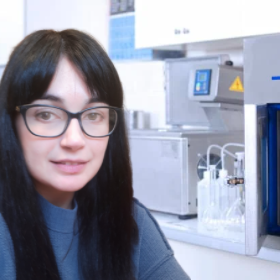
Dr Kamar Ameen-Ali
Name:
Dr Kamar Ameen-Ali
Job title:
Lecturer in Biomedical Science
Place of work / study:
Teesside University & Affiliate Researcher at Glasgow University
Area of Research:
How neuroinflammation following traumatic brain injury contributes to the progression of neurodegenerative diseases (such as Alzheimer’s disease) that lead to dementia.
I use human post-mortem brain tissue to understand how microglial function is altered following traumatic brain injury, and whether these changes are associated with the neuropathological hallmarks we typically see in diseases that lead to dementia.
How is your work funded?
National Institutes of Health (NIH)
Tell us a little about yourself:
Outside of work I enjoy running and swimming long distances, and I aspire to write a novel one day. Although I have no idea what it will be about!
Tell us about your career path.
I completed my undergraduate degree in Applied Psychology followed by a Masters in Cognitive Neuroscience, both at Durham University. I then worked for the NHS in various roles across both community and inpatient mental health [1] services.
I went back to Durham University for my PhD, which involved refining rodent behavioural tasks which are used to assess recognition memory. It was during my PhD that I became interesting in understanding the processes of memory function, and what happens to these processes in dementia.
After my PhD I took up a postdoc position [2] at the University of Sheffield where I worked with a mouse model of Alzheimer’s disease to assess the time course of cognitive impairment and corresponding neuropathology. Through this work I became interested in the function of immune cells in the brain called microglia, and how their function is altered in Alzheimer’ disease. For my next role I decided to gain experience of academia from another perspective and worked as a regional programme manager for the research funder NC3Rs.
I returned to research at Newcastle University, where I used human post-mortem brain tissue to investigate microglial function in post-stroke dementia. My interest in neuropathology, and particularly microglia, led to my current position at the University of Glasgow where I have been investigating how altered microglial function might contribute to the increased risk of developing dementia following traumatic brain injury.
Do you have any advice for someone looking to embark on a career in dementia research?
The career advice I always give my students is to follow what you’re interested in and you can’t go wrong. Dementia research is such a broad field so there are many different ways research can help us to understand more about the diseases which cause dementia, or enhance the lives of those living with dementia. I started with a degree in psychology and now work in neuropathology, so follow what you’re interested in even if it takes you down a different route.
What are the best bits about being an ECR?
I enjoy the varied nature of the role from working in the lab, writing, and data analysis, to going to conferences in exciting parts of the world. Having a wide array of tasks to engage in really keeps me motivated, as I think I would struggle with a repetitive workload.
What do you see as the main challenges?
The biggest challenge has to be the lack of job stability. It is becoming increasingly difficult to find posts that last longer than 24 months which for many people means having to move across the country, or even to other countries to find jobs. Many of us are not in one post long enough to build up the network and establish the foundations required to apply for fellowships. I have moved three times in the six years since completing my PhD, and I am now lucky enough to have a longish contract which will help me to advance my career.
Tell us a fun fact about yourself:
I have two guinea pigs: Phantom, who is very flamboyant, and Notorious, who is more laid back. Both have featured on TikTok.
Why did you choose to work in dementia?
I became interested in dementia during my PhD while I was researching mechanisms of memory function. Through trying to understand how our memory works, I also became interested in diseases which impair our memory from working as it should.
What do you write about?
I write about my experiences working in the NHS, for a research funder, and in academia. I also write about my area of research and give my perspective of what it is like working in a neuropathology lab.


